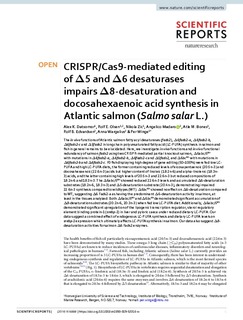CRISPR/Cas9-mediated editing of Δ5 and Δ6 desaturases impairs Δ8-desaturation and docosahexaenoic acid synthesis in Atlantic salmon (Salmo salar L.)
Datsomor, Alex Kojo; Olsen, Rolf Erik; Madaro, Angelico; Bones, Atle M.; Edvardsen, Rolf Brudvik; Wargelius, Anna; Winge, Per
Journal article, Peer reviewed
Published version

Åpne
Permanent lenke
http://hdl.handle.net/11250/2628966Utgivelsesdato
2019Metadata
Vis full innførselSamlinger
- Institutt for biologi [2579]
- Publikasjoner fra CRIStin - NTNU [38228]
Sammendrag
The in vivo functions of Atlantic salmon fatty acyl desaturases (fads2), Δ6fads2-a, Δ6fads2-b, Δ6fads2-c and Δ5fads2 in long chain polyunsaturated fatty acid (LC-PUFA) synthesis in salmon and fish in general remains to be elucidated. Here, we investigate in vivo functions and in vivo functional redundancy of salmon fads2 using two CRISPR-mediated partial knockout salmon, Δ6abc/5Mt with mutations in Δ6fads2-a, Δ6fads2-b, Δ6fads2-c and Δ5fads2, and Δ6bcMt with mutations in Δ6fads2-b and Δ6fads2-c. F0 fish displaying high degree of gene editing (50–100%) were fed low LC-PUFA and high LC-PUFA diets, the former containing reduced levels of eicosapentaenoic (20:5n-3) and docosahexaenoic (22:6n-3) acids but higher content of linoleic (18:2n-6) and alpha-linolenic (18:3n-3) acids, and the latter containing high levels of 20:5n-3 and 22:6n-3 but reduced compositions of 18:2n-6 and 18:3n-3. The Δ6abc/5Mt showed reduced 22:6n-3 levels and accumulated Δ6-desaturation substrates (18:2n-6, 18:3n-3) and Δ5-desaturation substrate (20:4n-3), demonstrating impaired 22:6n-3 synthesis compared to wildtypes (WT). Δ6bcMt showed no effect on Δ6-desaturation compared to WT, suggesting Δ6 Fads2-a as having the predominant Δ6-desaturation activity in salmon, at least in the tissues analyzed. Both Δ6abc/5Mt and Δ6bcMt demonstrated significant accumulation of Δ8-desaturation substrates (20:2n-6, 20:3n-3) when fed low LC-PUFA diet. Additionally, Δ6abc/5Mt demonstrated significant upregulation of the lipogenic transcription regulator, sterol regulatory element binding protein-1 (srebp-1) in liver and pyloric caeca under reduced dietary LC-PUFA. Our data suggest a combined effect of endogenous LC-PUFA synthesis and dietary LC-PUFA levels on srebp-1 expression which ultimately affects LC-PUFA synthesis in salmon. Our data also suggest Δ8-desaturation activities for salmon Δ6 Fads2 enzymes.
